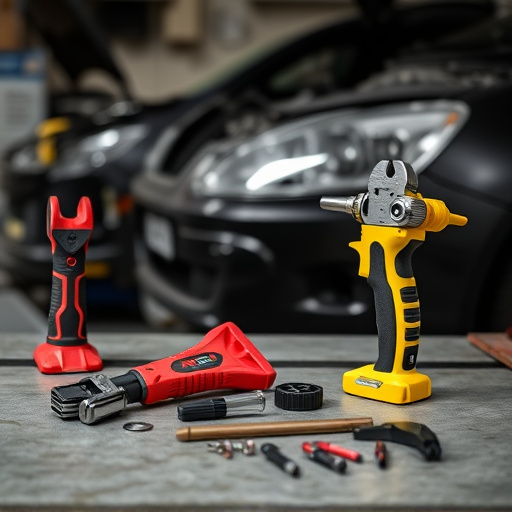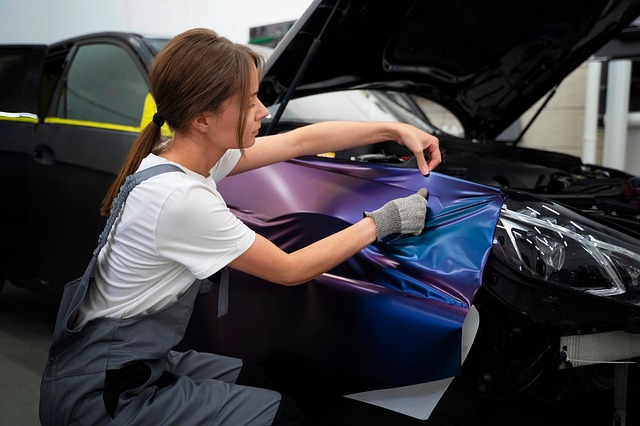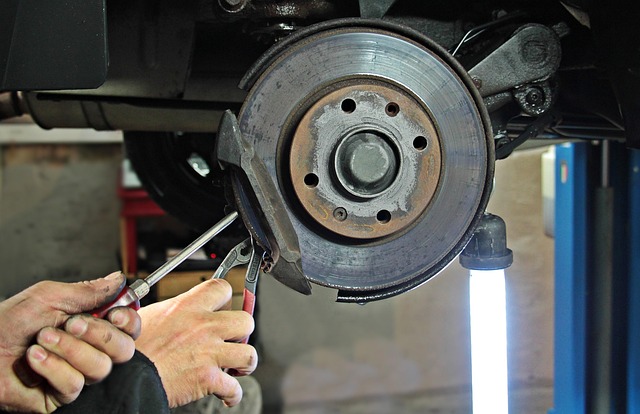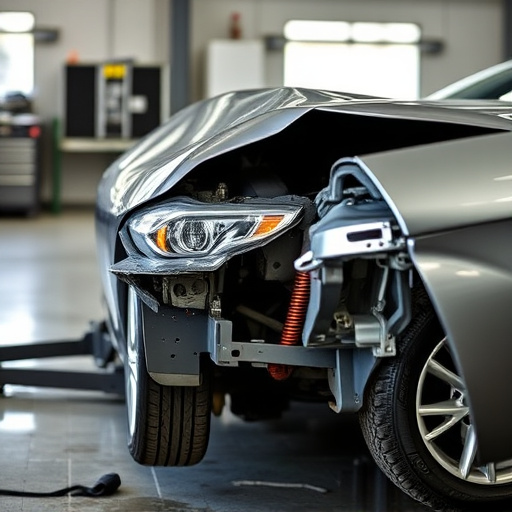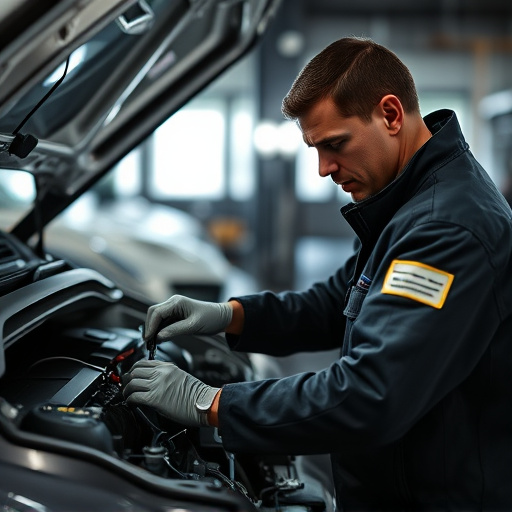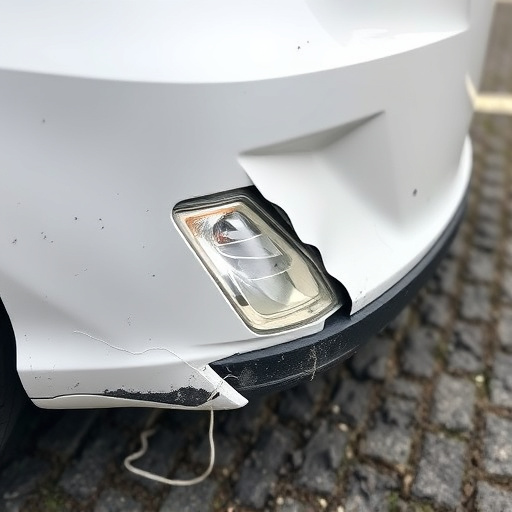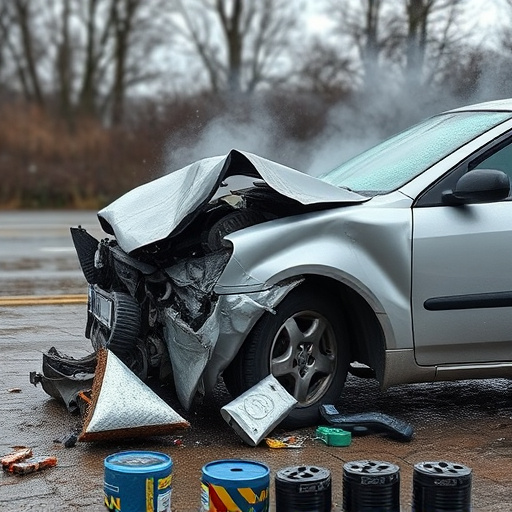After a collision, thoroughly inspecting the exhaust system, especially the catalytic converter, is crucial for effective repairs. Visible damage like deformity or cracks requires professional evaluation to ensure safety and environmental integrity. Skilled technicians assess both visible and potential internal harm using advanced tools. Prompt repair of damaged converters is vital for maintaining optimal vehicle performance, fuel efficiency, and reduced emissions. Exhaust system collision repair is essential for underbody damage, ensuring aesthetic restoration and continued road safety.
After a collision, it’s crucial to inspect your vehicle for signs of catalytic converter damage. This compact but vital component of your exhaust system plays a key role in reducing harmful emissions. Recognizing visual indicators like cracks, leaks, or misalignment is essential. If the converter is compromised, you’ll notice performance issues such as reduced engine power and increased exhaust noise. In such cases, turning to professionals specializing in exhaust system collision repair is advisable for safe and effective restoration.
- Recognizing Visual Indicators of Damage
- Understanding the Impact on Performance
- The Role of Professional Exhaust System Collision Repair
Recognizing Visual Indicators of Damage

When a vehicle experiences a collision, it’s crucial to inspect all critical components, including the exhaust system and catalytic converter. Recognizing visual indicators of damage is the first step in effective exhaust system collision repair. Look for signs like deformity, cracks, or leaks in the catalytic converter housing, which can often be spotted through visible inspection.
In the event of a crash, a damaged catalytic converter might present itself with noticeable bulges, dents, or breaks in the metal structure. These visual cues are red flags that signify further evaluation by a collision repair center. Proficient technicians will assess not just the visible damage but also consider potential internal harm, especially given the converter’s sensitive nature and its role in vehicle emissions. Remember, proper car dent repair and bumper repair extend beyond aesthetics; they ensure the safety and environmental integrity of your vehicle.
Understanding the Impact on Performance

A catalytic converter is a vital component of your vehicle’s exhaust system, playing a crucial role in reducing harmful emissions and improving engine performance. When a collision occurs, this sensitive part may suffer damage, leading to noticeable changes in your car’s behavior. Understanding how a faulty converter impacts performance is essential for drivers to recognize the signs and consider necessary repairs, such as exhaust system collision repair.
In a car collision repair scenario, if the catalytic converter sustains damage, it can result in decreased fuel efficiency and reduced engine power. This is because the converter facilitates the chemical reaction that converts toxic gases into less harmful substances. When damaged, this process becomes inefficient, leading to increased emissions and a potential loss of horsepower. Auto detailing professionals recommend regular checks for any signs of corrosion or loose connections, especially after minor car scratch repairs or more severe accidents, to ensure optimal vehicle performance and prevent further exhaust system collision-related issues.
The Role of Professional Exhaust System Collision Repair

When a vehicle experiences a collision, especially affecting the underbody, it’s crucial to turn to professionals for exhaust system collision repair. The catalytic converter, a vital component of modern vehicles’ exhaust systems, is delicate and complex. Even minor impacts can cause damage that requires specialized knowledge and tools for safe disassembly and reassembly. Professional mechanics in a well-equipped collision center have the expertise to assess and fix converter issues, ensuring proper fitting and sealing to prevent future leaks or performance problems.
Automotive collision repair goes beyond aesthetics; it involves meticulous attention to safety systems like the exhaust system. Skilled technicians employ advanced techniques and diagnostic tools to identify converter damage, often visible through discolored or misshapen components. They also check for cracks, corrosion, or misalignments that could signal more severe structural issues. Proper exhaust system collision repair not only restores the vehicle’s efficiency but also guarantees continued safety on the road, eliminating potential hazards associated with faulty catalytic converters.
When a vehicle experiences a collision, it’s crucial to inspect the catalytic converter for signs of damage. Beyond the obvious visual indicators, performance issues can also signal a problem. If your exhaust system has been affected, professional exhaust system collision repair is essential to ensure optimal engine performance and environmental compliance. Relying on experts in catalytic converter repairs can help avoid further complications and ensure your vehicle returns to its pre-collision state.

